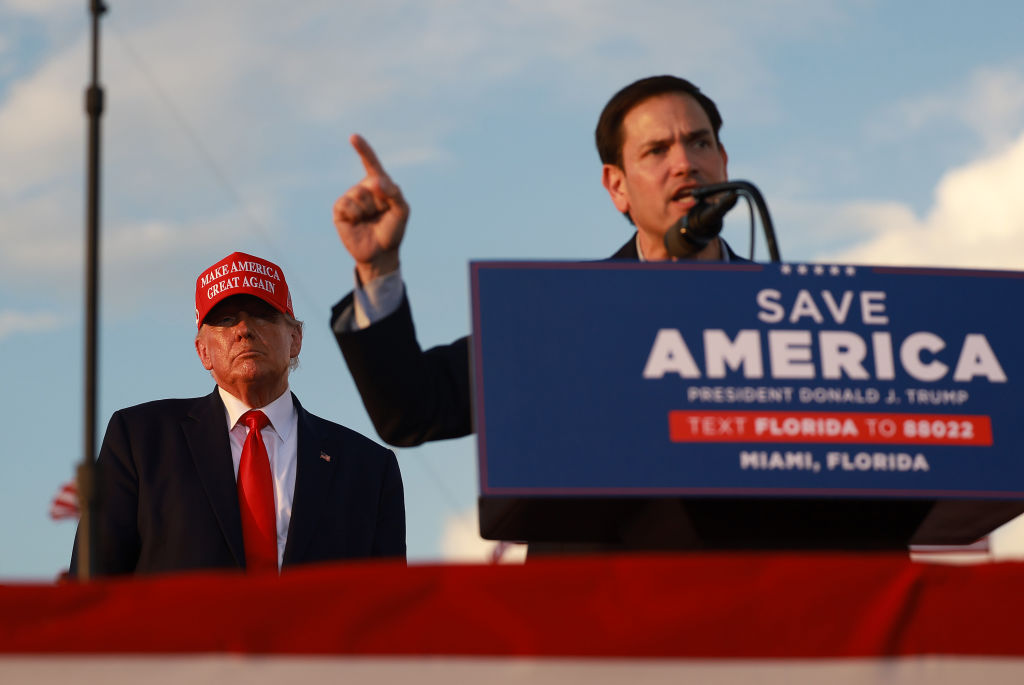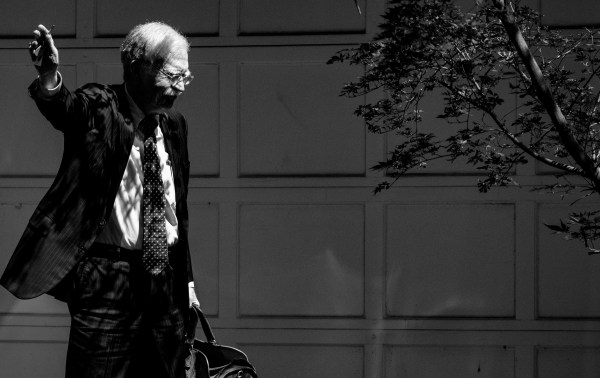On Tuesday Semafor reported that Donald Trump is considering several Republican senators for national security positions in his second administration. Among those mentioned were Marco Rubio and Tom Cotton, both of whom entered the Senate in the Before Times and both of whom declined to join the effort to stop Congress from certifying Joe Biden’s victory in 2021.
“Good Republicans,” one might call them, mindful that the curve on which Trump allies are graded for goodness is steep.
On Wednesday NBC News upped the ante by alleging that Rubio is “moving up the list” of potential Trump running mates. He’s “young and telegenic, he has spent more time in federal office than Vice President Kamala Harris, and, at a time when Trump is bullish on his chances of winning over Latino voters, he would be the first nonwhite person ever to make a Republican presidential ticket,” the outlet explained.
There are reasons for skepticism about all of this, and not just because a Trump-Rubio ticket might have a 12th Amendment problem.
According to Bloomberg, Trump’s vice presidential “short list” is getting longer, not shorter. As such, it’s anyone’s guess whether Rubio’s name was leaked because he truly is a serious contender or because Trump sees electoral advantage in letting it be known that a prominent Hispanic politician is in the mix. There’s also no downside to him in flattering sitting senators like Rubio and Cotton by touting them for important jobs even if the flattery is insincere. Every president needs loyal friends in the Senate, after all, especially ones in leadership (potentially).
Chatter about Rubio and Cotton might, in short, be little more than Trump’s flair for the dramatic leading him to gin up phony suspense around his next Cabinet by tossing out well-known names.
But what if it isn’t?
In the company Slack channel, Dispatch staffers raised a collective eyebrow at the prospect of respectable (relatively respectable) Republican senators joining the next Trump administration. “The perpetual dilemma,” one colleague sighed. That dilemma is familiar to all Trump critics: On balance, is it a good or bad thing to have responsible conservative actors working for Trump?
If you worry about him doing something nutty, and you should, then you should want him buffered by non-nutty people who’ll resist his worst impulses. But if he’s intent on doing nutty things in his second term no matter what his advisers tell him, and he probably is, then you should want to deprive him of any fig leaf of “respectability” that might be exploited to convince Americans that his actions are legitimate.
A Cabinet populated by Rubios or Cottons could restrain him—or it could enable him by lending him credibility that he doesn’t deserve. The perpetual dilemma.
The debate over that dilemma played out memorably two years ago on The Dispatch Podcast when our own Steve Hayes hosted Tim Miller of The Bulwark. Of course we should want responsible people in influential government positions, Steve argued. Trump wouldn’t be viable today if those responsible people hadn’t saved him from himself repeatedly in his first term, Miller countered.
Both had a point. And interestingly, each of their points has grown stronger as we stare into the abyss of a second Trump presidency.
The Hayes case in favor of wanting smart, responsible people staffing Trump’s next administration was summed up by another Dispatch colleague in the same Slack conversation I mentioned earlier. “It was immensely important to the country that Mike Pence and not Mike Flynn was VP on January 6, 2021,” he noted.
Underline the word “immensely” there a dozen or so times for proper emphasis. This sounds like hysterical hyperbole but it isn’t: Had a less principled actor presided over the counting of electoral votes that day, America as we’ve always known it might not exist right now.
You could extend that logic to the entire post-election period. Our anti-anti-Trump friends like to handwave away concerns about a future coup plot on grounds that “our institutions held” the last time Trump tried it, but the only reason they held is because there were principled Pence-type figures in key roles, especially among the federal judiciary, willing to tell Trump “no.”
Staff those institutions with a different caliber of people, as Trump’s minions hope to do, and next time you’ll get a different outcome.
That’s one of the recurring themes of this newsletter, in fact. Trump’s second term will be considerably worse than his first because his cronies are building an organizational infrastructure of post-liberal yes-men to staff it that didn’t exist in 2016. If it’s true that personnel is policy then we should emphatically prefer flawed but intelligent conservatives like Rubio and Cotton in important positions to the sort of authoritarian cranks who’ll fill those positions if they don’t.
I’m not sure what more needs to be said in support of Steve’s position. The clearer it becomes that proto-fascists are aiming to use Trump’s presidency as a vehicle for their agenda, the stronger the preference should be to have traditional Republicans who are still somewhat tethered to the rule of law filling out his Cabinet instead. You can (and should) hate Kevin McCarthy, but you should also very much rather see him as White House chief of staff than Steve Bannon. You can dislike Tom Cotton, but Cotton would oversee the Department of Homeland Security more thoughtfully than—deep breath—Vivek Ramaswamy.
As Trump sinks deeper into populist (and clinical) madness, the Hayes case for wanting solid people around him makes more sense than it did two or even four years ago. Wanting to hand over the U.S. government to the worst people in America to midwife a kakistocracy of grifters and fanatics seems downright unpatriotic.
But there are other reasons beside the obvious one to want the Rubios and Cottons of the GOP advising Trump.
The greatest policy crisis facing Reagan conservatives if Trump is reelected is that he’ll start withdrawing from alliances, beginning with NATO but probably not ending there. Just listen to his pal Tucker:
When the Taiwan question finally comes to a head and forces nationalists to choose between backing up their tough talk about China and standing aside while international illiberalism expands its borders, there’s no question what America-First-ers will choose. If Trump ends up with a Cabinet of people like that, look out.
Marco Rubio and Tom Cotton are foreign policy hawks, though, more McCain Republicans than MAGA Republicans. If they end up steering his national security policy, Beijing and Moscow will be left to wonder whether the United States might react to regional land grabs forcefully. Insofar as “peace through strength” requires a credible deterrent, that deterrent will be more credible with conservatives around Trump.
It’ll also drive the illiberal elements within his own base crazy.
Stocking the Cabinet with the likes of Rubio and Cotton might not cause a full-blown revolt against Trump among American populists but ideologues like Tucker Carlson will be beside themselves over it. The whole point of reelecting Trump, supposedly, is that he learned his lesson about trusting “globalists” the hard way in his first term and won’t repeat his mistake in a second. No more James Mattises or Rex Tillersons; Trump 3.0 will be Trump unleashed, untouchable this time by the treacherous neocons who would betray him.
So imagine populists’ surprise this week upon discovering that he’s allegedly thinking of putting two of the most militaristic members of the old-guard GOP in charge of national security again. If he follows through, it’ll prove just how gossamer-thin his “America First” ideology is: Because Trump respects “strength” and “toughness” above all things, he keeps finding himself drawn to pugilistic interventionists like John Bolton whose foreign policy preferences are poles apart from his own. Choosing Rubio and Cotton for top roles would prove that he’s learned nothing from that. A huge part of the nationalist rationale for reelecting him would be exposed as a sham.
It would be hilarious. Especially if we end up with a Trump-Rubio presidential ticket.
Trump fans might understand the strategic logic of choosing a Hispanic running mate at a moment when Hispanic voters are drifting right, but in many ways Rubio is (or was) the closest thing to Nikki Haley in the Republican Party apart from Haley herself. He’s young and nonwhite, Reaganesque on foreign policy, and not very trustworthy on important culture-war issues, none of which is a great match for a revanchist nationalist movement composed mainly of older white people. MAGA diehards learned to despise Haley during this campaign and might well end up despising Rubio, inevitably fretting that the “deep state” will contrive to have Trump killed in order to clear his new VP’s path to power.
All in all, there’s a lot to like in the Hayes case for wanting conservatives in Trump’s inner circle.
There’s a lot to hate too.
Earlier I used the word “unpatriotic” to describe those who would rather have Trump staff his administration with his favorite cranks and cronies. Is that fair?
The United States is a democracy. The people are sovereign and get to choose their leaders. What, precisely, is “unpatriotic” about letting Americans live with the personnel consequences of choosing Donald Trump to lead them, then?
The Hayes approach might have been the proper position in 2016, when voters didn’t know what they were getting from the new Republican nominee. The GOP at the time was still dominated by traditional conservatives, so the average Trump voter might understandably have expected his administration to reflect that. A Cabinet of Ramaswamys would have been both a surprise and a steep price for Americans to pay for having made a poor yet defensible assumption about what Trump’s presidency would look like.
Ignorance is long gone as an excuse for supporting Trump in 2024, though. He’s been impeached (twice); he’s been indicted (four times); he babbles like a lunatic in public appearances about stolen elections, crooked judges and prosecutors, and “retribution.” He did, in fact, attempt a coup that ended with an insurrection at the Capitol. Not only is he now promising to pardon some of those insurrectionists, whom he refers to as “hostages,” he recorded a song with a few of them—and salutes at rallies when it’s played.
“Democracy is the theory that the common people know what they want, and deserve to get it good and hard,” H.L. Mencken once said. If, after everything they’ve seen of him, Americans still want a second Trump administration, they deserve to get it good and hard. No more Rubios or Cottons this time; bring on the kakistocracy. Reap the whirlwind.
And if I’m wrong in thinking that Americans are fully aware of the risks of a second Trump, I would simply say: Whose fault is that?
That was the core of Tim Miller’s argument to Steve in their old podcast debate, and it’s why Miller’s point also looks stronger in 2024 than it did a few years ago. It’s wonderful that sensible actors around Trump in his first term managed to persuade him not to fire Robert Mueller, not to order a snap withdrawal from Afghanistan, not to invoke the Insurrection Act against protesters, not to seize voting machines after he lost the 2020 election, and not to make a hundred other terrible decisions he was inclined toward. But the net effect of all that has been to deceive the average blissfully unaware American voter into thinking that his first term was much more stable than it really was.
“Our institutions held,” right?
Go figure that those voters are ready to take a chance on him again. January 6 somehow wasn’t a hard enough lesson about populist authoritarianism to turn them against Trump and his movement durably, it seems, but maybe it would have been had responsible figures like Mark Milley, Don McGahn, and Pat Cipollone not interceded to avert numerous other Trump-driven catastrophes. He might even have lost the 2020 election decisively enough that the “rigged election” nonsense wouldn’t have gotten much traction.
He’s older now, more vindictive, more paranoid, and more illiberal—and is on the precipice of a second term anyway because the country didn’t get to see who he really was for most of his presidency. Think of it like a viral infection: Because the first infection wasn’t serious enough to produce civic antibodies, the body politic is unprepared to fend off a more virulent mutation. Trump may be so far gone temperamentally at this point, frankly, that it won’t end up mattering if he staffs up with conservatives next year. He’s going to do whatever he wants to do, and whatever that might mean for America.
Now, let’s be real. As much as we’d like to believe that Marco Rubio and Tom Cotton would stand up to him in a Cabinet meeting at a fateful moment, how much faith can we really place in a chump as pitiful as this?
Rubio has spent eight years becoming a reliable apologist for a lousy, coup-plotting, strongman-hugging freak. He’s hardly alone in that—witness Sen. Mike Lee, for instance, who’s reportedly being considered for attorney general—but it seems absurd to think that he’ll meaningfully influence Trump as a member of the administration when it’s Trump who’s been meaningfully influencing him since 2016. Most of the Tea Party cohort in Congress has sold out its conservative beliefs piecemeal over time for the sake of protecting and advancing their careers in an increasingly statist party. That’s not going to change when they join the Trump Cabinet, lord knows.
And if Rubio or Lee or anyone else surprises us by insisting on doing the right thing when Trump demands otherwise, Jeff Sessions’ fate awaits them. The modern Republican Party does not lack obedient cultists willing to heed their leader’s commands; if Trump’s conservative deputies resist him, he’ll follow the same trajectory he did in his first term by eventually replacing them with yes-men apparatchiks in an “acting” role.
They must realize it, too. Any “respectable” Republican who chooses to ride the Trump carousel will do so knowing that the price of admission is agreeing to behave less scrupulously than Mike Pence did on January 6 if and when called on to do so. Some ambitious figures have made that pledge explicitly; everyone who joins the administration will be making it implicitly. No one who serves in the next Trump government will do so with honor.
One more thing. If, like me, you believe that a Trump defeat this fall would be good for conservatism and for America, the prospect of having conservatives in the Cabinet is dreadful.
It’s exactly the sort of enticement that might tip the 20 percent of the GOP that’s reluctant to vote for him again into taking the plunge. “How crazy can Trump really be,” Haley voters might reason, “if he’s prepared to put mild-mannered establishmentarians like Marco Rubio and Tom Cotton in positions of power? Surely they’ll keep him in check if he goes off the rails.” That could be the difference between defeat and victory.
The only good thing that might come out of this election is conservatives finally ending the Republican hostage crisis by turning their backs en masse on the loathsome illiberal populist movement that’s captured their party. If a bit of window dressing in the form of making Marco Rubio head of the CIA or whatever is enough to keep them in the fold, they’re hopeless. It’ll amount to a total victory for mindless partisanship over what’s left of classical liberalism.
The attitude Reaganites should take toward this race is the one Jonah Goldberg quoted at the recent Principles First summit in Washington. “Let your credo be this,” Aleksandr Solzhenitsyn wrote. “Let the lie come into the world, let it even triumph. But not through me.” There’s nothing to be done about the fact that Marco Rubio and Tom Cotton don’t share that sentiment. But every voter can and should take it to heart.







Please note that we at The Dispatch hold ourselves, our work, and our commenters to a higher standard than other places on the internet. We welcome comments that foster genuine debate or discussion—including comments critical of us or our work—but responses that include ad hominem attacks on fellow Dispatch members or are intended to stoke fear and anger may be moderated.
With your membership, you only have the ability to comment on The Morning Dispatch articles. Consider upgrading to join the conversation everywhere.